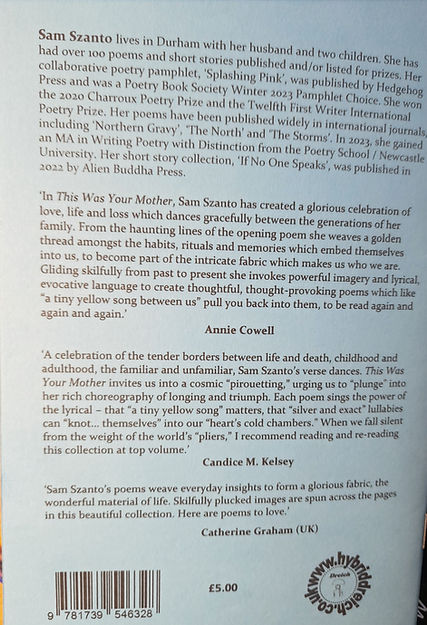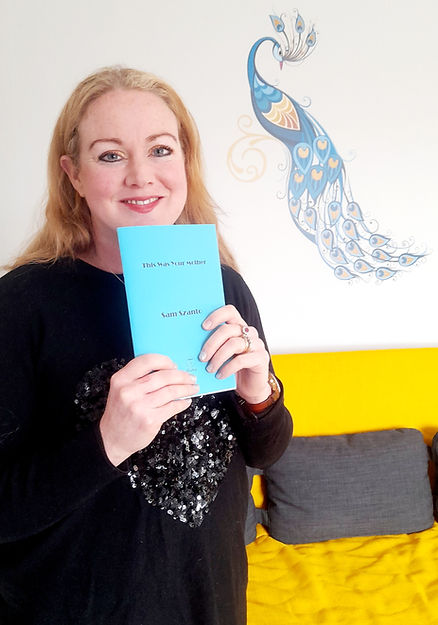James McConachie: 'We live in a time of climate breakdown and pitiless wars; I keep returning to the desire to hold up a mirror to those themes'
- samszanto2
- Jan 11
- 4 min read

A chat with James McConachie about his poetry collection, Consolamentum (Black Bough Poetry, 2024)
How would you describe Consolamentum in one sentence?
I suppose it’s both a celebration of the wild life of the mountains, with its still largely untroubled biodiversity and the rugged demands it puts on us, while also a lament, for what I always think of as the unnecessarily miserable human condition.
How did you structure the collection?
Well, I tried not to overthink it, and failed. There is some fairly harrowing poetry in there, so I tried not to group too much of that together. As the seasons dominate much of the life described it seemed logical to divide it up like that. I guess like everyone, I printed the poems out and spread them all over the floor until I felt I was going slightly mad.

How long did the book take to write?
I’d say I wrote the poems over the course of a couple of years, not that I set out to write a collection as such, they just sort of gathered.
There are many words in Spanish (and a few in other non-English languages) in the poems, most of which are translated below. I wondered if you ever write entirely in Spanish, and if so how differently it feels to writing in English in terms of what you produce?
Oddly, I suppose, I don’t. Though my Spanish is pretty fluent, I’d say the nuance so critical to poetry is still just a bit beyond me.
What would you say are the main themes of the collection?
We live in a time of climate breakdown and pitiless wars; I keep returning to the desire to hold up a mirror to those themes, in fairly blunt language. There is a hint of my, perhaps, slightly wayward past here and there. Maybe that offers some light relief.
Time seems to be of particular importance in the poems – the division of the collection into seasons, poems like ‘8-hour Shift’, etc. I’m always interested in how the lyric poem plays with time – in a small space, we can occupy the past, present and future, whereas the white space can occupy a timelessness – and I wondered whether you could talk about poetry’s relation to temporality, for you?
I wish I could write more timeless poetry that dealt with the eternal, somehow removed from what seem to be the pressing concerns of the everyday. I’m not sure that’s my brief, though.
In fact, I have to confess I sometimes find that kind of poetry irritating, as though by being aloof it’s also somehow obtuse. But that’s a me problem.
I guess lots of my poetry of witness is very concretely happening in a particular moment, and the desire to ‘hold up a mirror’ makes that seem urgent. I do like narrative poetry, that captures the simple joy of an afternoon for example, or a night out on the tiles. I haven’t given temporality much thought to be quite honest, I’ll clearly have to.
Do you have a favourite of the poems?
Hmmm. I’m drawn to the more joyful poems I think, though some of the harder stuff maybe does its job more effectively. I quite like ‘Routards’ - about goofing around France in my 20s because it’s a bit sultry, maybe even sexy.
How did you choose an editor?
I stumbled back into poetry after rocking up at an online open mic run by the press, Black Bough. Matthew M.C Smith, the editor, was so encouraging, I don’t know if I wouldn’t have just fizzled out if it weren’t for his enthusiasm. When he opened a competition for full collections it was obvious I was going to send it his way.
Which other poets inspire your work?
I’d say top of the bill, upon reflection, is Séamus Heaney, for his unapologetic use of assonance, internal rhyme, even end-line rhyme, which is unfashionable, but carries an impact. My ex and kids are Irish, so there’s something about Hiberno-English that feels right and natural and familiar to me.
For a long time I was a big fan of Edward Thomas, but now his work seems a little stiff and oddly anachronistic, I suppose it’s a century old. I spent a long time with a great collected works of Ted Hughes, whose lines always stick with me and seem to pop into my head at odd moments. I also lived for a few years outside Granada and though I wouldn’t claim him as a conscious influence, Lorca gets under your skin without you being aware of it, through flamenco. I’m always envious of the way US poets work so languidly with free verse and being a fan of poetry that deals with sex in an honest and tender way, I do love Sharon Olds.
If you could have a blurb from anyone – living or dead – who would it be and why?
Seamus Heaney, Good Lord, imagine.
How does Consolamentum compare to what you have written previously?
I really started out with essays and something approaching nature writing. I was desperate to convey how wonderful an unperturbed natural environment can be, especially when compared to the sadly nature-depleted reality in the UK. Writing about a long horse-trip, where I became very ill and wrote about my fever dreams made me realise how much I liked the liberty with language poetry can afford.
Do you have any other writing projects in the pipeline?
A second collection is taking shape fairly rapidly, though I may have to discard some flotsam. I’m working on a prose/CNF thing quite enthusiastically, probably taking in similar themes to my poetry. It’s taking shape slowly as I let it lead me, rather than the other way around.
Have you any readings or other events planned to promote the book?
Not really. I live out in the middle of nowhere, far removed from my Anglophone audience. I’d love nothing more than a reading tour of Britain and Ireland. One can but dream.
Please send a link so people know where to buy the book:










Comments